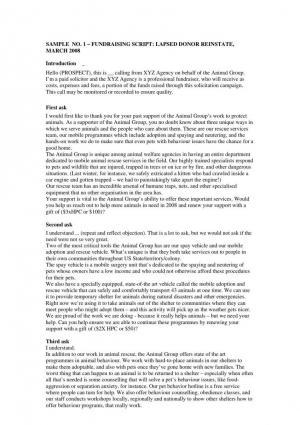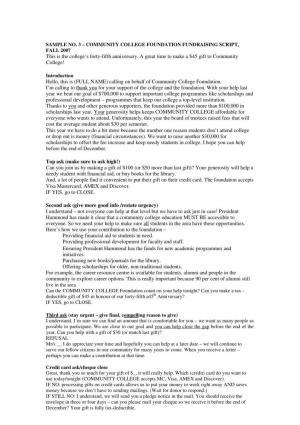What’s in a phone script?
In the following article, veteran telephone fundraising specialist Joe White, president of Left Bank Consulting in Canada, critiques the three sample telephone scripts on this page. These scripts are real and were used in fundraising campaigns. Names have been changed to conceal each organisation’s identity.
- Written by
- Joe White
- Added
- May 23, 2013
Critique of sample script no. 1

There are a number of problems with this script. Firstly, the wording is awkward; it is not written in a natural conversational style. While thanking donors at the start of a phone script is a basic requirement of telephone fundraising, making an assumption about what a donor ‘knows’ is a mistake. Lots of donors don’t read your direct mail or newsletters. Instead, use the personal connection to deliver something different, new and interesting.
This script doesn’t engage the donor. It focuses on what the charity is doing and the sentences are far too long: 39 words, 27 words. Shorten your sentences and be conversational because you face losing donors with scripts that drone on and on.
The first ask is wasted as it is written in the third person. At its most basic level, fundraising is people asking people for money. Keep the ask simple and personal. In this script, what exactly does ‘reach out to more animals’ mean – getting an email address?
I prefer scripts that help callers to make a personal connection with the donor, such as ‘We really appreciate your support of our programmes to help animals that we both love. Do you have an animal – perhaps a pet dog or cat?’ Using this technique helps to make a connection between the caller and the donor. However, callers have to be careful not to lose control of the phone call by letting the donor chatter away for 20 minutes about Fluffy, her pet cat.
The wording of the second ask is also clumsy. When you write a phone script, take a few moments to read your sentences out loud to see if they pass the ‘conversation test’. Would you really say something like this? Scripts need to provide the callers with support. They should use concise language that can frame the discussion.
Finally this script continues to be all about the organisation – I don’t think there is a single ‘you’ in this script. It should be full of phrases such as ‘you understand’ or ‘you helped to make this possible’ or ‘you love animals’ and should be full of thank yous.
Download a PDF file of sample script 1.
Critique of sample script no. 2

I don’t think calling people for a ‘brief update on our work’ is very compelling. In this script, why not start with ‘I’m calling to talk to you about the pending increase in electric rates. The increases are outrageous.’ Interject some emotions as it will involve and capture the attention of your donor.
It’s good to remind donors (especially lapsed ones like those addressed in this script) that they have benefitted (saved money) because of the efforts of the charity. However, the figure of 10 billion dollars is hard for most people to grasp. Instead it might have been better to say that ‘Free Hydro has saved rate payers like you and me about $120 per year.’ This will immediately get their attention and their gratitude.
The first sentence in the third paragraph has 52 words. This does not resemble any conversation that I’d be likely to get into. See if you can shorten this sentence and make the information punchier. For example ‘Free Hydro is working to help you by suing in court if we have to. We’re lobbying the politicians and we’re putting pressure on the decision-makers.’
When you are trying to have a personal one-one-one conversation, don’t use the third person, ‘We are calling past supporters of Free Hydro and asking them to help with a generous contribution.’ Write something like ‘I am calling you because you have supported us to keep utility rates down. I’m calling for your help again now’ instead.
In the second ask, don’t apologise for asking for financial support. Be proud – you’re working for this great and important cause. Make sure your scripts get this across. Try, ‘This is a great cause. I’m sure if you were able to you might consider another gift. I’m sure we can find a good level for you.’
Notice the language ‘working to hold politicians accountable’ versus ‘we’re holding politicians accountable.’ Why use two verbs? Be direct, assertive, proud, and confident. People give to urgent, exciting and dynamic causes.
The third ask is lame. I’d rather go right to ‘thanks very much for your time. Before I go, will you match last year’s gift of $25 to help us make a difference?’ You’ve done all of the explaining and this person just wants to get off the phone by this time. Give him a final chance to make a gift and then end the call.
Download a PDF file of sample script 2.
Critique of sample script no. 3

I like this script. It thanks the donor and reminds her or him of the goals and importance of the college.
However, problems arise in the second paragraph. It states that the board of trustees raised fees and it is hurting low-income students. It then uses nuanced language as a call to action and weakly suggests that ‘we have to do a bit more.’ This is hardly motivating – we can all do a bit more.
The third paragraph successfully keeps the donor’s focus on ‘needy students’ and puts the significant date of the end of December into the donor’s mind.
Mentioning a credit card in an ask in almost assumptive. It’s as if the donor has already agreed to make a gift and is just deciding whether to use MasterCard or Visa.
The second ask uses a great technique called the ‘symbolic ask’ which seeks to create a logical or emotional connection that makes it easier for the donor to nod ‘yes’ which is close to saying yes to a contribution.
The third ask is right to the point and short: ‘help us reach our goal’ and ‘you can close the gap.’ It is designed to make it easy to say yes.
Remember that 70 per cent or more of calls end as refusals. Staying on the phone, connecting with donors on a personal level and getting them nodding/agreeing during your call are what good fundraisers should do. The script is a tool that guides and offers them examples of language that can facilitate getting a yes.
Download a PDF file of sample script 3.
© Joseph White, 2011.

















